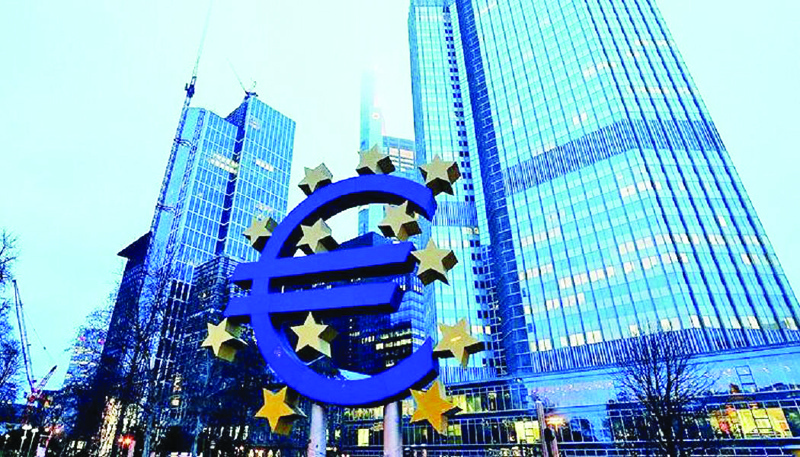 FRANKFURT: European Central Bank's 25-member governing council held interest rates at their historic lows yesterday, including a negative bank deposit rate that means lenders pay to park excess cash at the central bank. - AFP
FRANKFURT: European Central Bank's 25-member governing council held interest rates at their historic lows yesterday, including a negative bank deposit rate that means lenders pay to park excess cash at the central bank. - AFPFRANKFURT: European Central Bank policymakers shrugged off rising inflation across the eurozone when they met yesterday, with the bank leaving its massive stimulus program unchanged. While supply disruptions have pushed up prices and squeezed industrial production, the ECB kept its accommodative monetary policy stance as it seeks to nurse the economy back to health from the impact of the coronavirus pandemic.
The bank's 25-member governing council held interest rates at their historic lows, including a negative bank deposit rate that means lenders pay to park excess cash at the central bank. And it decided its massive monthly bond purchases would continue at a "moderately lower" rate than in the second and third quarters in a turbulent period for the eurozone economy.
The 1.85-trillion-euro ($2.15-trillion) pandemic emergency bond-buying programme (PEPP) is the ECB's main crisis fighting tool, aimed at keeping borrowing costs low to stoke economic growth. Attention will now shift to the press conference of ECB President Christine Lagarde, who faces the difficult task of deciding when to remove stimulus without threatening the recovery or letting inflation run out of control. Analysts expect Lagarde to nod to changing economic circumstances in her statement without prejudging the outcome of the bank's crucial coming policy meeting in December.
'All her energy'
Behind the status quo stance, policymakers are split between hawks, who favor tighter monetary policy to stifle inflation, and doves, who want to maintain the bank's expansive policy. In September, prices in the euro area rose 3.4 percent year-on-year, a 13-year high driven by soaring energy costs, and well above the bank's two-percent inflation target.
Lagarde will have needed "all her energy" to bring the two sides of the argument together, said Carsten Brzeski of ING, and could favor a "neutral" tone in her remarks. The ECB's meeting comes a week before policymakers at the US Federal Reserve and the Bank of England gather to discuss possible changes to their own monetary policies.
The Fed has already signaled that it is "getting closer" to winding down its stimulus program, as inflation in the US climbs higher. The Governor of the Bank of England Andrew Bailey, meanwhile, has stated that the British central bank "will have to act" on inflation, setting off speculation that a rate hike could come as soon as next week. Elsewhere in the European Union, rate-setters have reacted sharply to inflation, with both Polish and Czech central banks making their biggest rate rises in years.
December rendezvous
The prospect of the ECB following suit seems distant, not least because "inflationary pressures are less pronounced in the eurozone than in the US", according to Holger Schmieding, chief economist at Berenberg Bank. The ECB has insisted that the inflation spike is "temporary" in nature, driven by one-off pandemic-related effects that will gradually dissipate over the course of 2022.
Labor markets in the 19-country euro area were more "sluggish" than the UK and US, meaning it would take longer for wage inflation-an indicator the ECB is watching closely-to become apparent, Schmieding said. While markets have been pricing in a rise somewhere near the end of 2022, there would be "no ECB rate hike before 2024", forecast Frederik Ducrozet, a strategist at Pictet Wealth management. October's ECB meeting was more about "paving the way" for December's promised decision on the ECB's stimulus program, Ducrozet said.
At the last meeting of the ECB's governing council in September, policymakers dialed back the pace of purchases, while deferring decisions on when it might end. Most observers expect the scheme to end in March next year, but ideas are being kicked around as to how the ECB could continue its exceptional support for the economy into the future. A separate pre-pandemic asset-purchasing program, currently running at a pace of around 20 billion euros a month, could be boosted or altered to give the ECB more flexibility. - AFP










